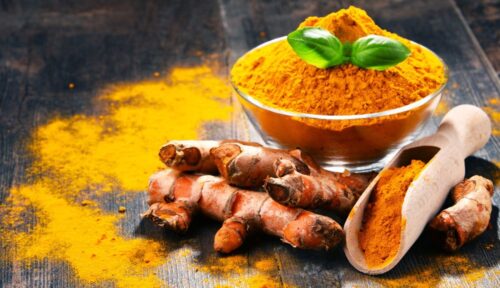
Dr. Nicole Sundene, NMD
Scottsdale Naturopathic Doctor
Turmeric is one of the most potent pain herbs in Naturopathic Medicine. Turmeric, botanically known as Curcuma longa, is a rhizomatous herbaceous plant known for its wide range of health benefits. It has great potential for treating and preventing a variety of medical conditions. The primary medicinal properties of Turmeric include anti-microbial, antioxidant, anti-cancerous, and anti-inflammatory activity. Historically, Turmeric was used as a spice in a meal and for medicinal and cosmetic purposes.
Turmeric's major phytochemicals are curcumin, zingiberene, eugenol, curcumenol, turmeronols, curcumol, turmerin, and turmerones. It also contains Vit C, beta-carotene, zinc, niacin, manganese, copper, iron, calcium, fiber, and potassium [1, 2].
Curcuminoids, including curcumin, desmethoxycurcumin, and bisdemethoxycurcumin, are the major and medicinally popular constituents of Turmeric. It is important to know that Turmeric is mostly reported for its medical benefits due to curcumin. However, Turmeric contains a limited amount of curcumin so, one must take extracted curcumin powder instead of taking whole Turmeric [2, 3, 4].
Health benefits of Turmeric and Curcumin:
Curcumin is the yellow flavone that is the most potent concentration of the herb as a pain reliever and has been used for centuries as a natural and safe remedy for medical ailments. Following are some of its prominent and common health benefits. First we will discuss turmeric research and then we will discuss curcumin research:
Strengthen the Immune system:
Turmeric boosts the immune response of the body via its anti-inflammatory and antioxidant activity. It helps the body to combat unfavorable conditions and reduce the risk of oxidative stress and inflammation. It also modulates other natural antioxidants' activity in the body, including glutathione peroxidase, superoxide dismutase (SOD), and catalase. These antioxidants inhibit the free radical generation and increase the neutralization of toxins [4, 5].
Turmeric shows an anti-inflammatory activity via downregulating the production of pro-inflammatory mediators. These mediators include Tissue Necrosis Factor-α, Interleukin -6, Transforming Growth Factor-β, and monocyte chemoattractant protein (MCP-1) [4, 5].
Turmeric improves immunity level against infections agent via its anti-microbial activity. It helps the body to relieve cold, nasal congestion, and flu by modulating the immune response against allergens and infectious agents. It has been reported that Turmeric increases the level of activated natural killer cells, macrophages, T- and B- lymphocytes, IgG, and dendritic cells. Turmeric's immunomodulatory effect significantly enhances the immune system fighting viral and bacterial infections, including H. Pylori, Escherichia coli, and methicillin-resistant staphylococcus aureus [2, 3, 6].
Studies have reported that Turmeric improves respiratory tract infections symptoms, including asthma, sinusitis, bronchitis, and difficulty in breathing. It also acts as an analgesic and relieves pain during arthritis [3, 4, 6].
Turmeric also increases the level of interleukin 10 that have anti-inflammatory activity by blocking inflammatory cytokines' production. It enhances the immune system against pathogens and also has an essential role in preventing asthma [3, 4, 6].
Turmeric speed up the wound healing process by stimulating the production of the growth factors. It has a positive effect on tissue and collagen that support the wound healing process and improve the cycle of wound restoration [3, 15, 16].
Improve Vitality and Longevity:
Turmeric reduces the risk of developing different medical ailments that improve and support vitality and longevity. It protects cellular integrity and prevents DNA damage by removing free radicals and relieving oxidative stress. It promotes mental health by reducing the symptoms of depression and stimulating the nervous system. It may alleviate mental stress and improve mood [3, 13, 14].
Studies have also reported the neuroprotective effect of Turmeric. It protects brain cells against toxins, boosts memory and learning capability, and may improve Alzheimer's disease symptoms. A study also proposed that Turmeric reduce the risk of Alzheimer's disease via decreasing the accumulation of amyloid, inhibiting CRMP-2 hyperphosphorylation, and preventing hippocampal damage that has a vital role in the development of neurodegenerative diseases [6, 11].
Turmeric helps to improve cancer symptoms, including lung cancer, colorectal cancer, hepatic cancer, and slows down its progression to other organs. This action is attributed to the activity of CD4+ and CD8+ defensive cells. Turmeric stimulates and increases the level of these cells that kills abnormal cells in the body [6].
Turmeric supports gastrointestinal health by preventing the development and progression of intestinal disorders, including ulcerative colitis, gastric lesions, and ulcer [4,5,6].
Medical studies have reported that Turmeric improves the symptoms of degenerative eye conditions, including central serous chorioretinopathy, which involves retinal microglial cells. It may also relieve other eye conditions such as dry eye, maculopathy, glaucoma, and diabetic retinopathy [8, 9].
Anti-aging Activity:
Turmeric improves skin texture and possesses anti-aging activity by limiting sebaceous glands' secretion and increasing collagen deposition. It prevents skin damage, improves fine lines, wrinkles, and dark spots. Also, tightens the skin, enhances its firmness, supports skin tone, and provides a younger look. It also reduces the risk of obesity and diabetes via suppressing angiogenesis in adipose tissue and increases adipocyte energy metabolism [3, 4, 5, 10].
Support Cardiovascular, Metabolism, and Joint's function:
Turmeric assists the heart, brain, and joints' normal functioning via its anti-inflammatory and antioxidant activity. It helps to improve and support cardiovascular function by reducing the plasma level of triglycerides and total cholesterol. It reduces the level of bad cholesterol and prevents the risk of developing cardiovascular dysfunctions, including atherosclerosis. Also, helps to improve vascular supply and support normal blood pressure [3, 4, 5, 6].
Turmeric supports healthy joints via its relieving inflammation and pain-relieving effect. It helps in the reduction of osteoarthritis, bursitis, and rheumatoid arthritis symptoms. Studies have reported that bioactive compounds in Turmeric prevent metabolic syndrome development via decreasing serum concentration of pro-inflammatory cytokines. Also, improves insulin sensitivity, suppresses adipogenesis, and reduces elevated blood pressure [3, 4, 5].
Warnings/Precautions:
Turmeric is almost safe and effective against the above discussed medical conditions; however, certain side effects are reported with its use. These side effects include allergic reactions, diarrhea, nausea, yellow stool, and headache. Also, it can increase serum alkaline phosphatase and lactate dehydrogenase contents in some individuals.
It is advised not to consume Turmeric without first consulting with your Naturopathic Doctor.
If you are going to undergo any surgery, it is recommended to stop turmeric or any vitamins and herbs two weeks prior. Ask your Naturopathic Doctor about the use of Turmeric prior to using in pregnancy or breastfeeding.
Turmeric should not be taken concomitantly with the following medications without checking with your Naturopathic Doctor [12]:
Important note:
Medical studies have reported that Curcuminoid, the active constituent of Turmeric, has low absorption and bioavailability after oral ingestion. It is recommended to take it with black pepper or piperine that increases its bioavailability by 2000%.
Are you sick of being in constant pain and need to treat yourself to an appointment with the Naturopathic Pain Doctor? Simply pop over to my SCHEDULE page to book your Naturopathic consultation immediately!
Thank you for your Women's Health and Herbal Medicine questions. Please send them to me on a postcard to the address below as I love to get something in the mail that is not a bill. Remember if your question cannot fit on a postcard then you need to treat yourself to a Naturopathic visit with me. Simply pop over to my SCHEDULE page to get set up. I love helping women with their chronic pain and autoimmune disease.
Dr. Nicole Sundene, NMD
(480) 837-0900
Dr. Sundene is a Naturopathic Doctor in Scottsdale, Arizona, and is considered a Female Hormone Expert in Women's Health and Bioidentical Hormones. She specializes in Holistic Women's Health for Menopause, Thyroid, Hashimotos, PMS, Perimenopause, Autoimmune, Postpartum Depression, Chronic Fatigue, Holistic Psychiatry, Depression, Anxiety, Chronic Pain, Autoimmunity, Food Sensitivities, Digestion, Dermatology, Acne, Psoriasis, Eczema, and Adrenal Hormonal Conditions. In 1999 she began working for a Hormone Doctor prior to starting Naturopathic Medical School. With over 22 years of experience in both Prescription and Natural women's health and hormones, she presents to women the best-integrated health solutions for their Chronic Disease. She has been an Herbalist for over 27 years and enjoys teaching women how to use herbs to balance their hormones, nutrition and optimize their health. Dr. Sundene relies on blood testing for her hormone metrics. The hormone testing is covered per the patient's insurance plan and conducted at certain points in the woman's menstrual cycle. To learn more about Hormone Testing for Women Visit: Bioidentical Hormones. Follow Dr. Sundene on Instagram, Twitter, and Facebook for more tips on Women's Health, Female Hormones, and Naturopathy!
References:



works of gallnut extract
I love the curcumin syrup you recommended in my coffee. It actually tastes delicious and I can feel it working and need less pain meds. You are brilliant. Love you!
Jenna
Great blog! Thanks Doc!